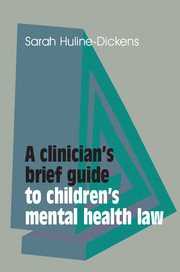Book contents
- Frontmatter
- Contents
- Foreword
- Acknowledgements
- List of cases
- Common abbreviations and terms
- 1 Introducing child mental health and the law
- 2 The rights of the child
- 3 The Children Act 1989 and the 2004 amendments
- 4 Consent to treatment
- 5 Confidentiality
- 6 The Mental Health Act
- 7 The Mental Capacity Act
- 8 Juvenile justice
- References
- Index
1 - Introducing child mental health and the law
Published online by Cambridge University Press: 02 January 2018
- Frontmatter
- Contents
- Foreword
- Acknowledgements
- List of cases
- Common abbreviations and terms
- 1 Introducing child mental health and the law
- 2 The rights of the child
- 3 The Children Act 1989 and the 2004 amendments
- 4 Consent to treatment
- 5 Confidentiality
- 6 The Mental Health Act
- 7 The Mental Capacity Act
- 8 Juvenile justice
- References
- Index
Summary
With the increasing complexity of culture and society comes confusion. Several changes in UK legislation affecting children's mental health have taken place over the past two decades. These have included the Human Rights Act 1998 (HRA) and the case law deriving from it, the Mental Capacity Act 2005 (MCA) and, in 2007, the amendments to Mental Health Act 1983 (MHA). We therefore find ourselves in some difficulty concerning the clarity of what can and cannot be done to look after young people's mental disorders and safeguard their rights.
Fortunately, there are already good guides written specifically for clinicians on both the MHA and the MCA: A Clinician's Brief Guide to the Mental Health Act (Zigmond & Brindle, 2016) and A Clinician's Brief Guide to the Mental Capacity Act (Brindle et al, 2015). These cover a lot of ground, and Zigmond & Brindle's book includes how to become section 12 approved and the process of tribunals and making appeals. Neither, however, was intended to deal with the particular problems of the law as it relates to children and adolescents with mental disorders. Complementing these volumes, this book will focus on the rather peculiar relationship between a young person with a mental health disorder and the law, as mediated by family, community and doctors.
The last book published by the Royal College of Psychiatrists on child psychiatry and the law (Black et al, 1998) has a good deal of information about assessing parenting capacity and how to act as an expert witness, but it now seems curious that it mentions the MHA only in passing. This must indicate some quite significant shifts in the preoccupations of the specialty of child and adolescent psychiatry and its scope of practice.
In this book I will not cover court work or how to act as a witness. I will instead focus on essential elements of children's mental health law. For clinicians acting as expert witnesses many guides are available, such as Expert Psychiatric Evidence (Rix, 2011), which has a chapter dedicated to reports for family proceedings relating to children. Richardson & Casswell (2010) also provide useful advice. Clinicians acting as expert witnesses need to be aware of regulations in the new Children and Families Act 2014 (Part 2, section 13).
- Type
- Chapter
- Information
- Publisher: Royal College of PsychiatristsPrint publication year: 2016

